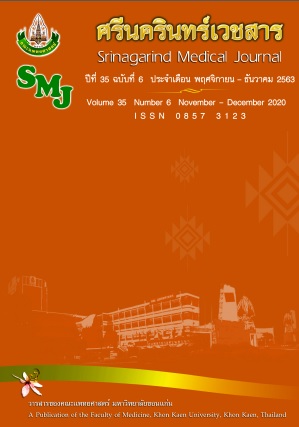The Effect of Options Counselling and Factors Associate with Decision Making on Pregnancy Options Among Unintended Pregnant Adolescents and Youths
Keywords:
option counseling; unintended pregnancy; adolescent; youth; decision makingAbstract
Background and Objectives: An options counselling for unintended pregnant women is provided by Srinagarind hospital to support them to make their own choices. This study aimed to study the effects of options counselling and factors associate with decision making on pregnancy options among unintended pregnant adolescents and youths.
Methods: A retrospective study over three years (2016-2019) was conducted. The data were retrieved from the medical records of unintended pregnant adolescents and youths who participated in the options counselling program at Srinagarind hospital. This study included pregnant adolescents and youths aged 24 years old and under. The sociodemographic data and decision making on pregnancy options were gathered and analyzed by the Fisher’s exact test.
Results: Thirty-one of samples with average age was 17.9 years old (SD ±3.0). Eighty-four percent were students from high school and college. Almost 94 percent were primigravida. The average gestational age at first visit was 12 weeks and 6 days (SD ±7 weeks and 6 days). The pregnant adolescents and youths who decided either to continue a pregnancy to term or terminate a pregnancy were accounted for 38.7 and 61.3 percent, respectively. In addition, 58.4 percent of them decided to use the effective contraceptive methods. Gestational age at the first visit was associated with decision making on pregnancy options (Fisher’s exact test 9.54, df=1, p=0.007). Age, occupation, number of pregnancies, contraceptive methods and healthcare access (by herself or being referred) were not significantly associated with decision making on pregnancy options.
Conclusion: Most of unintended pregnant women decided to terminate their pregnancies. The first visit was late for some women that could lead to delay receiving options counselling and minimize their choices. The release information of options counselling should be provided for all unintended pregnant women to promote healthcare accessibility within early trimester for reducing the crisis of unintended pregnancy.
References
2. UNICEF. Situation analysis of adolescent pregnancy in Thailand: synthesis report.[internet]2015 [cited July16,2020] Available from: https://www.unicef.org/thailand/sites/unicef.org.thailand/files/2018-08/160614_SAAP_in_Thailand_report_EN.pdf
3. Menezes GM, Aquino EM, da Silva DO. Induced abortion during youth: social inequalities in the outcome of the first pregnancy. Cad Saude Publica. 2006;22:1431-46. Available from: doi:10.1590/s0102-311x2006000700008
4. คณะกรรมการสิทธิมนุษยชนแห่งชาติ.ปัญหาเยาวชนหญิงที่ตั้งครรภ์ก่อนวัยอันควรกับมิติสิทธิมนุษยชน.2559.สำหนักงานคณะกรรมการสิทธิมนุษยชนแห่งชาติ: กรุงเทพมหานคร.
5. Kate Grindlay , Phyllis Dako-Gyeke, Thoai D Ngo, Gillian Eva, Leonard Gobah, Sarah T Reiger, et al. Contraceptive use and unintended pregnancy among young women and men in Accra, Ghana. PLoS One 2018 ; 13(8): e0201663. doi: 10.1371/journal.pone.0201663.
6. Rizvi F, Williams J, Hoban E. Factors influencing unintended pregnancies amongst adolescent girls and young women in Cambodia. Int J Environ Res Public Health 2019;16:4006. doi:10.3390/ijerph16204006.
7. กรมอนามัย สำนักอนามัยการเจริญพันธุ์. สถานการณ์การอนามัยเจริญพันธุ์ในวัยรุ่นและเยาวชน ปี พ.ศ. 2561: นนทบุรี [internet] 2561 [สืบค้น เมื่อ 10 มิถุนายน 2563] Available from: http://rh.anamai.moph.go.th/ewt_dl_link.php?nid=86
8. เวชระเบียนการฝากครรภ์. สถิติในการให้บริการรับฝากครรภ์ โรงพยาบาลศรีนครินทร์ มหาวิทยาลัยขอนแก่น: 2561.
9. Siriporn Chirawatkul, Bumpen Kumdee, Darunee Jongudomkarn, Ingkata Kotanara, Krittaya Sawangchareon, Nilubon Rujiraprasert, et al. Situations for teenage pregnancy: perceptions among teenagers living in 7 provinces of Thailand. J Health Science 2012; 21: 865 – 877.
10. ศิริพร จิรวัฒน์กุล. การให้คำปรึกษาทางเลือกสำหรับวัยรุ่นที่ตั้งครรภ์. TJNC [Internet] 2016 [cited 2020 June.16];31:5-16. Available from: https://he02.tci-thaijo.org/index.php/TJONC/article/view/56797
11. David A Moss, Matthew J Snyder, Lin Lu. Options for women with unintended pregnancy. Am Fam Physician 2015; 91: 544-549.
12. Holt K, Janiak E, McCormick MC, Lieberman E, Dehlendorf C, Kajeepeta S, et al. Pregnancy options counseling and abortion referrals among US primary care physicians: results from a National Survey. Fam Med 2017; 49: 527-536.
13. Kavanaugh ML , Jerman J, Frohwirth L. It’s not something you talk about really: information barriers encountered by women who travel long distances for abortion care. Contraception 2019; 100: 79-84. doi.org/10.1016/j.contraception.2019.03.048
14. Nikkhesal N, Nourizadeh R, Dastgiri S, Mehrabi E. The factors affecting women’s decision about unplanned pregnancy: A hierarchical modeling strategy. Int J Women's Health Reprod Sci 2018; 6: 483-490.
15. Brauer M, van Ditzhuijzen J, Boeije H, van Nijnatten C. Understanding decision-making and decision difficulty in women with an unintended pregnancy in the Netherlands. Qual Health Res 2019; 29: 1084-1095. doi:10.1177/1049732318810435.
16. ศูนย์อนามัยที่ 9 กรมอนามัย. แนวทางการดูแลและส่งต่อวัยรุ่นตั้งครรภ์เพื่อป้องกันการตั้งครรภ์และการแท้งไม่ปลอดภัย เขตนครชัยบุรินทร์ 2559. โรงพิมพ์อินดี้อาร์ต: นครราชสีมา. [internet] 2559 [cited August 8, 2020] Available form http://203.157.71.141/ewt_dl_link.php?nid=899&filename=health_Promotion.
17. สำนักอนามัยเจริญพันธุ์. พระราชบัญญัติการป้องกันและแก้ไขปัญหาวัยรุ่นตั้งครรภ์ พ.ศ. 2559.[internet] 2559 [cited August 8,2020] Available form: http://rh.anamai.moph.go.th/ewt_news.php?nid=8&filename=index.
18. Sjöström S, Dragoman M, Fønhus MS, Ganatra B, Gemzell-Danielsson K. Effectiveness, safety, and acceptability of first-trimester medical termination of pregnancy performed by non-doctor providers: a systematic review. BJOG. 2017;124:1928-1940. doi:10.1111/1471-0528.14712.




